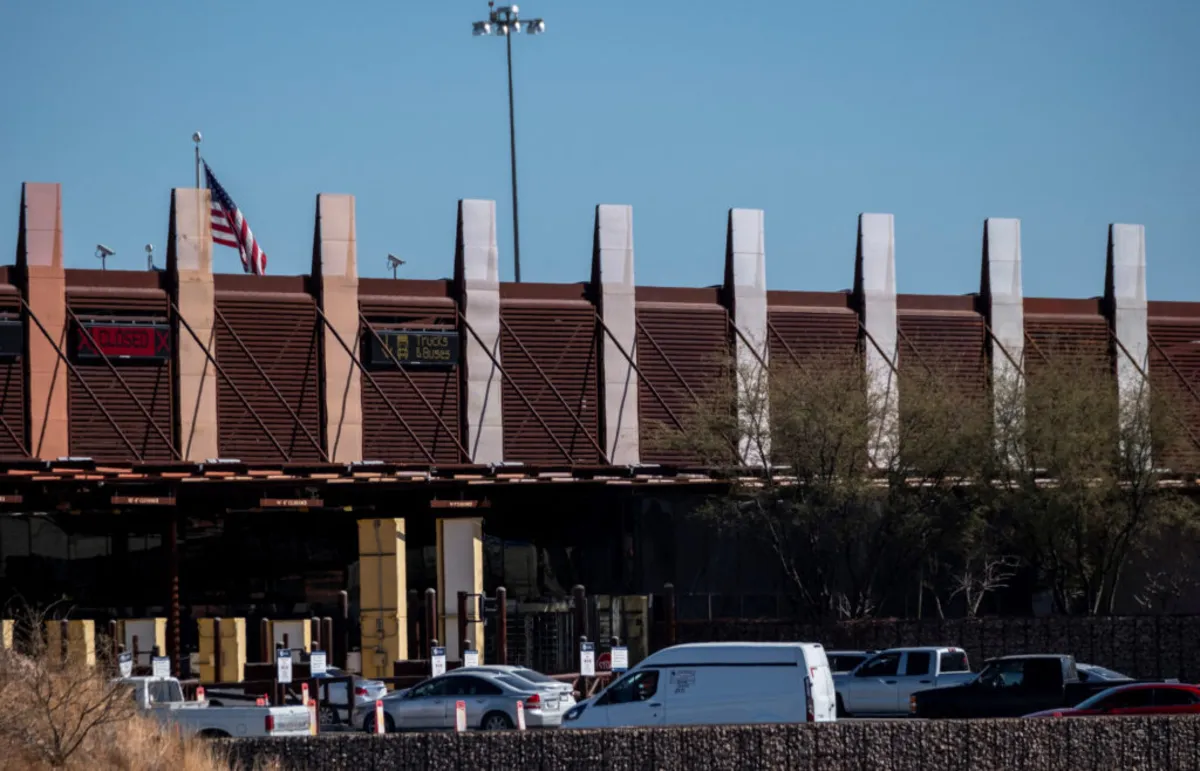
SAN DIEGO (AP) — Lennon Tyler, a U.S. citizen, and her fiancé, Lucas Sielaff, who is German, enjoyed numerous road trips to Mexico during his visits to the United States. These trips were one of the benefits of their long-distance relationship, as it was only a day’s drive from her home in Las Vegas. However, their recent return from Tijuana took a shocking turn when they were stopped at the U.S. border, leading to a harrowing experience for both.
Upon their return to the U.S. last month, U.S. border agents handcuffed Tyler and chained her to a bench while Sielaff was accused of violating the terms of his 90-day U.S. tourist permit. The couple detailed that authorities subsequently handcuffed and shackled Sielaff, imprisoning him in a crowded U.S. immigration detention center. He endured an agonizing 16 days in detention before he was permitted to fly back to Germany.
Since the presidency of Donald Trump, there have been multiple reports of tourists like Sielaff facing detention at U.S. border crossings, with some held for weeks in U.S. immigration facilities before being released at their own expense. For instance, another German tourist, Jessica Brösche, faced a similar fate after being detained for over six weeks, including more than a week in solitary confinement. Reports also emerged of a Welsh backpacker spending nearly three weeks in a detention center and a Canadian woman on a work visa being held for 12 days before her release.
Both Sielaff and others in similar situations reported a lack of clarity regarding the reasons for their detention, even after expressing a willingness to return home voluntarily. Pedro Rios, the director of the American Friends Service Committee’s U.S.-Mexico border program, stated that in his 22 years of experience, he had never witnessed travelers from Western Europe and Canada, who are typically U.S. allies, being treated in such a manner. He emphasized that the rationale for such detentions was perplexing and did not justify the inhumane treatment the individuals faced.
The incidents have heightened anxiety surrounding tourist travel to the U.S., especially as the Trump administration prepares to impose bans on travelers from specific countries. The University of California, Los Angeles, recently issued a notice to its foreign-born students and staff, advising them to consider the risks associated with travel during spring break, highlighting that re-entry requirements could change while they are away.
Immigration and Customs Enforcement (ICE) communicated that Sielaff and Brösche were deemed inadmissible by Customs and Border Protection (CBP), which did not provide specific details on their cases. The agencies indicated that if visa terms are violated, travelers may face detention and removal from the U.S.
In light of the recent detentions, both Germany and the United Kingdom have updated their travel advisories, warning travelers about strict U.S. border enforcement. The UK specifically cautioned that individuals could face arrest or detention if they violate entry rules.
Sielaff arrived in the U.S. on January 27 and, just weeks later, he and Tyler decided to visit Tijuana for four days due to the affordability of veterinary services there. They returned on February 18, still well within the limits of Sielaff’s tourist permit. However, their experience turned grim when a U.S. border agent aggressively questioned Sielaff, leading to his detention.
During the interrogation, Sielaff maintained that he had never lived in the U.S. and had no criminal background. He described a harrowing ordeal that included a full-body search and the confiscation of his belongings. After spending two days on a bench in a holding cell, he was transferred to the Otay Mesa Detention Center in San Diego, where he shared a cell with eight others.
Both Tyler and Sielaff described their experience as a blatant abuse of power by U.S. border authorities. Tyler expressed a desire to take legal action against the U.S. government. The couple is now reconsidering their plans to hold their wedding in Las Vegas. Sielaff, traumatized by the experience, suffers from nightmares and is contemplating therapy to cope with the emotional fallout. “Nobody is safe there anymore to come to America as a tourist,” he lamented.
The troubling experiences of Tyler, Sielaff, and others emphasize the growing tensions surrounding U.S. border policies and their impact on international travelers. As legal battles continue over immigration practices, the need for clearer and more humane border policies becomes increasingly urgent.